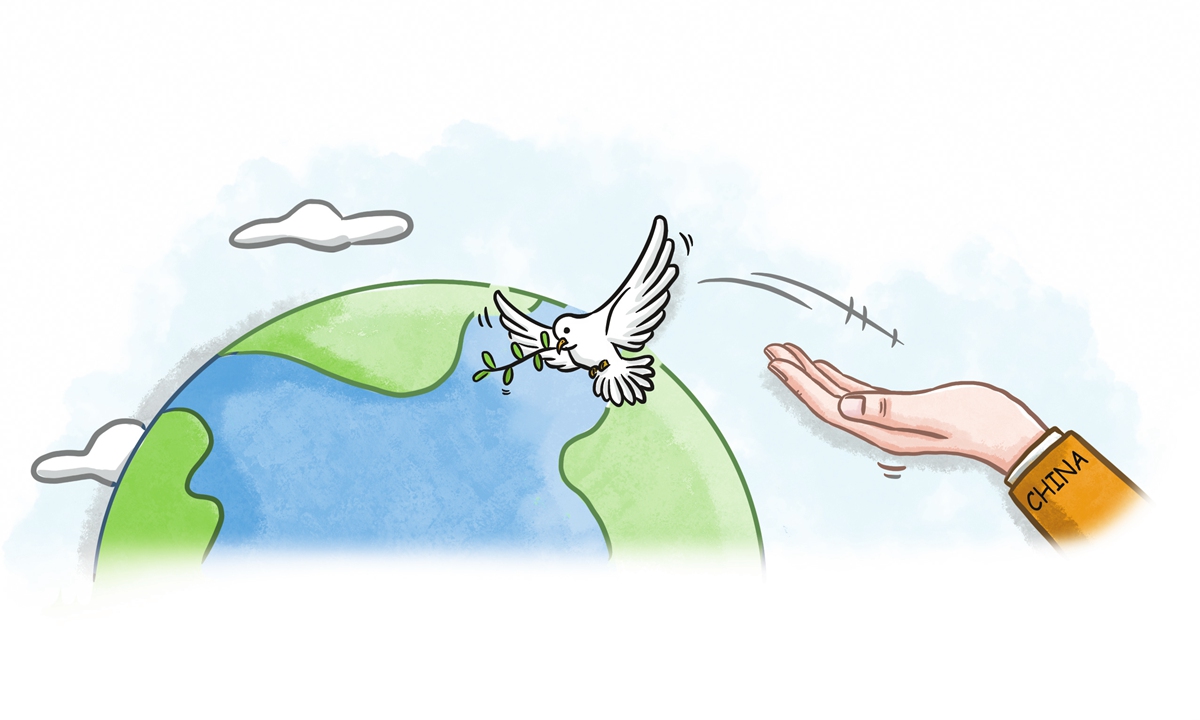
Illustration: Xia Qing/GT
Why has Beijing become the stage for peace? Why has China's mediation been so successful? What new ideas and results have emerged? China actively advocates and implements the Global Security Initiative. On issues of peace and security, China has the best record of all major powers. China is also the only country in the world that has enshrined the path of peaceful development in its constitution and the only nuclear power that has committed to not use nuclear weapons first.
70 years ago, China proposed the Five Principles of Peaceful Coexistence, namely mutual respect for sovereignty and territorial integrity, mutual non-aggression, mutual non-interference in each other's internal affairs, equality and mutual benefit, and peaceful coexistence, which have been widely accepted by the world and have become an important norm in modern international relations. These principles are embedded in China's constitution and form the cornerstone of China's independent and peaceful foreign policy.
Furthermore, China is the largest contributor of peacekeeping personnel among the permanent members of the UN Security Council, and therefore, China's role as a defender of world peace is indisputable.
Beijing has worked to explore a Chinese way of addressing hotspot issues, reflecting its responsibility as a major country. The signing of the Beijing Declaration by 14 Palestinian factions in July shows that China actively participates in the reform of the global governance system, advocates dialogue and inclusiveness rather than confrontation and exclusivity. China also demonstrates that it is a responsible major country that is distinct from the Western model in maintaining global stability and development.
Regarding how to properly resolve international conflicts, Member of the Political Bureau of the CPC Central Committee and Foreign Minister Wang Yi stated that China has worked to explore a Chinese way of addressing hotspot issues, one that advocates for non-interference in internal affairs and opposes imposing one's will on others; upholds impartiality and justice and opposes pursuing selfish interests; seeks political settlement and opposes using force; aims to address both the symptoms and the root causes and opposes myopia and one-sidedness. Thus, China was trusted as a fair, well-intentioned and reliable mediator and a force for peace in promoting reconciliation in the Middle East.
China offers new ideas for peace and development in the war-torn Middle East. China does not sit back and watch, make war profits or seek personal gain. Instead, it puts forward the concept of peaceful development and win-win cooperation based on the interests of the people and countries in the region, focusing on the Palestinian issue, which is the core issue of the Middle East.
China has pushed for the adoption of the first UN Security Council resolution on the Israel-Palestine conflict since its outbreak, issued a position paper on the political solution to the Palestine-Israel conflict, and advocates that the fate of the Middle East region should be in the hands of the people of the Middle Eastern countries. China calls for accelerating the realization of an independent Palestinian state and holding a larger, more effective international conference to truly achieve peaceful coexistence of Palestine and Israel. This just position has been widely recognized and trusted by Middle Eastern countries, who are pleased to see China leading the way in mediation and negotiation.
Similarly, in response to the protracted and intensified crisis in Ukraine, China insisted on building consensus and paving the way for peace talks. Chinese leaders had in-depth communications with leaders of various countries, including Russia and Ukraine, taking on a constructive role in addressing the crisis. China has issued position papers and sent special envoys to mediate on many occasions, actively seeks to join forces with other countries and has already reached a consensus with Brazil on the political resolution of the Ukraine crisis by de-escalating the situation and promoting peace talks.
Beijing has never been absent in resolving international hotspot issues, and its active mediation has drawn significant attention. This highlights its responsibility in promoting the resolution of regional conflicts and maintaining world peace. In the face of risks and challenges, more and more people expect China to continue offering Chinese solutions and wisdom to solve global problems and achieve peace.
In conclusion, as China embarks on a new journey of modernization and becomes stronger, it will never resort to colonial plundering or seek hegemony. It will instead stay on the right path of peaceful development, serving as a staunch force for stability in a turbulent world and continue to build a world that enjoys lasting peace and universal security. The more China develops, the more contribution it will make to world peace.
The author is Consul-General of the People's Republic of China in Brisbane. opinion@globaltimes.com.cn




